Hacking trial: Defence story so far
- Published
The trial of former News of the World journalists accused of a conspiracy to hack mobile phones is now well under way at the Old Bailey.
It is a long and complex trial and the jury of nine women and three men has been listening to many months of evidence.
The defendants deny all the charges and you can find answers to basic questions about the trial here.
This page is a summary of the defence case - latest coverage at the top. The prosecution case wrapped up in the first week of February.
Rebekah Brooks in the witness box
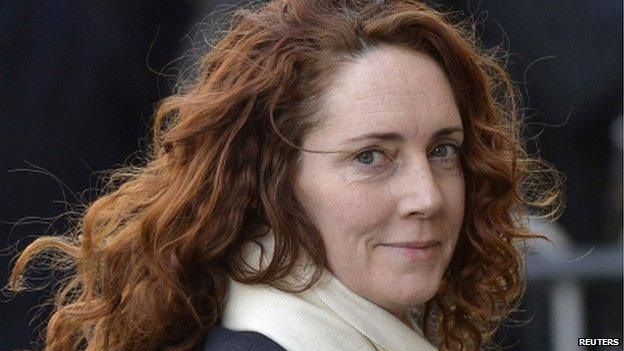
The defence cases in the hacking trial began on 20 February with Rebekah Brooks, the former News of the World and Sun editor.
Before she entered the witness box, the judge instructed the jury to find Mrs Brooks not guilty of one of the charges she had faced.
The judge said that she should be formally acquitted of an allegation that she had authorised a reporter at the Sun to pay for a picture of Prince William in a bikini. Mrs Brooks entered the witness box still facing one allegation of conspiracy to intercept voicemails, one allegation of corrupt payments to public officials and two counts of conspiracy to pervert the course of justice.
During her first day in the witness box, Mrs Brooks told the jury that she had never heard of the private investigator Glenn Mulcaire during her leadership of the News of the World.
Mulcaire has already admitted being part of a conspiracy to intercept voicemails alongside journalists at the newspaper.
Mrs Brooks said that it was common practice for Fleet Street to employ private detectives - but she denied that the News of the World had set up a "dark arts department" tasked with acquiring information by illegal or dubious means.
Tom Symonds reports on Rebekah Brooks's first day giving evidence
During the second day of her evidence, Mrs Brooks described her personal life as a "car crash", referring to her failed marriage to EastEnders star Ross Kemp and her affair with former News of the World editor Andy Coulson.
She also told the jury that she did not know that the newspaper once agreed a £92,000 contract with Glenn Mulcaire.
Mrs Brooks also told the jury that she did not know that phone hacking was illegal when she was editor of the News of the World - but during her time in charge no journalist ever asked her to sanction a voicemail interception.
She told the Old Bailey she felt "shock and horror" after she discovered murdered schoolgirl Milly Dowler's phone had been hacked.
She told the jury about her "disbelief" and "shock" when News of the World royal editor Clive Goodman was arrested over allegations of hacking in 2006.
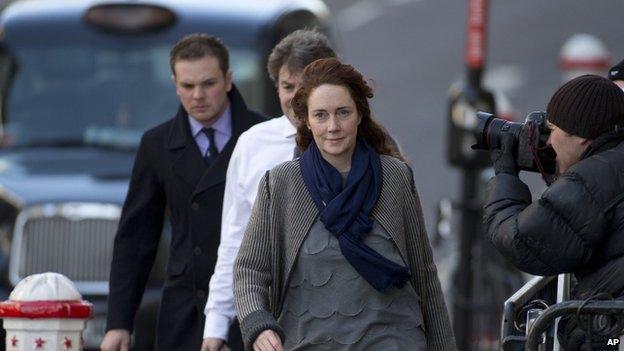
Rebekah Brooks is one of seven defendants on trial at the Old Bailey over alleged phone hacking
Mrs Brooks had already moved on to become editor of the Sun - and she told the court that when she learned of the reporter's arrest she asked her staff if they were using private detectives in an unethical manner.
Her evidence moved into the next allegation - that she knowingly approved corrupt payments to public officials.
Mrs Brooks said that had approved payments to public officials - but only when there was an "overwhelming public interest" and that been on a handful of occasions between 1998 and 2009.
She told the jury that public officials had approached the papers asking for money in exchange for information.
The former editor said: "If there wasn't a public interest defence then it was not done because it was considered to be illegal."
Mrs Brooks said that one of the greatest errors of judgement of her time as editor at the Sun had been to prevaricate over paying a public official for the full data on MPs' expenses - allowing the Daily Telegraph to get in there first.
She said that journalists at the rival newspaper had not faced a criminal investigation because of the high level of public interest in the full scale of the expenses.
On one occasion, after the newspaper had paid a naval officer for information about an alleged plot relating to anthrax, she told the jury she had been summoned to Downing Street where top security officials urged her not to publish.
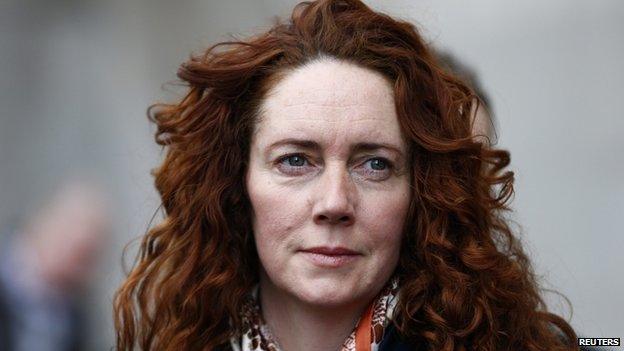
Rebekah Brooks said she met Andy Coulson at a London hotel to tell him about the evidence
On the seventh day of her evidence, Mrs Brooks said that in January 2011, she arranged a meeting with Andy Coulson, by then the prime minister's head of communications, to warn him that "pretty incriminating evidence" was emerging from the renewed police investigation into hacking.
She defended News International's strategy to agree confidential damages settlements with people alleging hacking, saying that it would lower the company's financial liabilities.
The following day she revealed she had received death threats after it emerged that Milly Dowler's phone had been hacked. She said she had received a message of support from former Prime Minister Tony Blair.
Mrs Brooks told the court she "just lost it" when her husband Charlie told her he might be arrested because his "rather large porn collection"' had been found by police behind some bins at their apartment complex car park.
Andrew Edis QC, prosecuting, began his cross-examination suggesting that she had been involved in a massive cover-up - something she denies.
Mr Edis asked if she had done "any investigation at all" into hacking after she became chief executive, but she said there "wasn't a need" because the information was "already out there".
Mrs Brooks says she did not know that the News of the World had paid Glenn Mulcaire £92,000 - payments which were made weekly and signed off by the then managing editor Stuart Kuttner.
Mr Edis accused her and others of cooking the books to ensure that the payments were buried in the accounts, meaning nobody would be able to find out what Mr Mulcaire was doing. Mrs Brooks said: "I did not cook any books."
On her 11th day in the witness box, she told the court that cash payments by the Sun and the News of the World to sources were "part of the normal business" and did not equal criminality.
Back on hacking, Mr Edis said she "must have known" that the newspaper had listened to Milly Dowler's voicemail because it sent reporters to chase a lead relating to a message on the phone.
But she denied being an editor who was only concerned about getting stories first, rather than how the newspaper got them.
Mr Edis said she must have been aware of what those around her were doing, including managing editor Stuart Kuttner, senior reporter Neville Thurlbeck and news editor Greg Miskiw
During the final moments of her evidence, trial judge Mr Justice Saunders said to Mrs Brooks: "Phone hacking was a big story. The suggestion being made to you is the only reason you were involved in damage limitation [is] that you would not have done that unless you yourself had been involved."
Mrs Brooks said she had felt "comfortable" for years about not being involved in the affair and had "no reason to worry about my own position".
Clive Goodman gives evidence
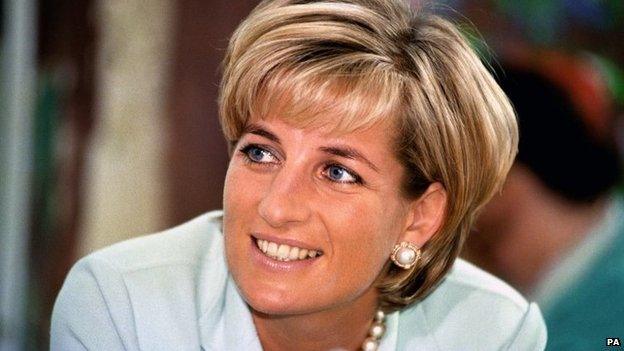
Princess Diana gave Clive Goodman a phone directory, he told the Old Bailey
The second defendant to appear in the witness box was Clive Goodman, the News of the World's former royal editor, who has already been convicted and jailed for hacking.
He faces a charge of conspiracy to pay public officials for confidential phone directories from the royal household.
Mr Goodman said that one of the directories came from Diana, Princess of Wales. He said that she handed it over to show the forces "ranged against her" by her estranged husband.
The former royal reporter denied ever using the directories for hacking. He also said that the culture at the newspaper was "quite bullying and menacing".
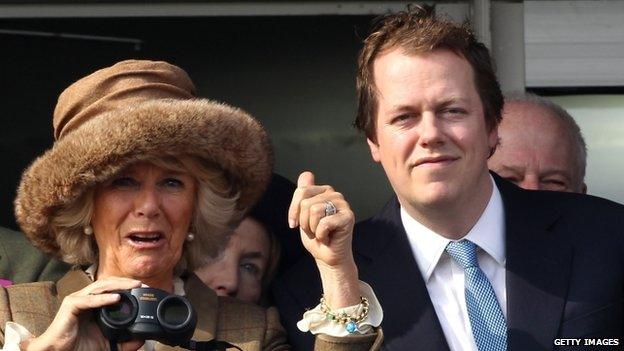
Clive Goodman admitted he had hacked the phone of the Duchess of Cornwall's son, Tom Parker Bowles
Mr Goodman also told the jury that he had sometimes inflated the importance of some of his sources to ensure that Andy Coulson would speed up payments - but he denied ever paying a police officer for his royal phone directories.
Clive Goodman's evidence on his hacking went further than previously known. He said he had hacked a phone belonging to a royal aide to Prince William and also Tom Parker Bowles, the Duchess of Cornwall's son. His 2007 hacking conviction related to targeting three other members of the royal household.
He said some of the information he needed to perform a hack had come from former News of the World news editor, Greg Miskiw, who has already pleaded guilty.
The former royal reporter said Andy Coulson had authorised additional payments to Glenn Mulcaire so that the private investigator could "monitor" three royal household phones - payments that had come from the newspaper's editorial management budget.
He said that he shown Mr Coulson a transcript of a voicemail message left by Prince Harry in December 2005.
After his original 2006 arrest, Clive Goodman said he went to an internet cafe to download emails he had written and received while working at the newspaper, some of which related to stories sourced through hacking.
"I was very concerned I was going to get left high and dry for all the phone hacking at the News of the World," he told the jury.
Former NOTW Royal Editor Clive Goodman told the court Andy Coulson authorised payments of £500 per week
About a week after the arrest, Mr Goodman said that Andy Coulson told him that he would get his job back if he "kept silent" about the extent of phone hacking.
The editor allegedly met the reporter in a cafe and said: "All you've got to do is say you were a lone wolf."
During his evidence, Mr Goodman said that Andy Coulson knew how some stories had been acquired through hacking. He said he had used the codename "Alexander" to refer to Glenn Mulcaire.
Under cross-examination, Mr Goodman was asked whether Andy Coulson understood that Alexander meant Mulcaire.
Mr Goodman answered: "Yes."
Timothy Langdale QC, for Mr Coulson, then asked: "And that what Mr Mulcaire was doing as part of the Alexander project was hacking phones?"
Mr Goodman responded: "Yes."
Mr Langdale went on: "So he knew all about that project... he knew it was Glenn Mulcaire hacking. That's what the Alexander project was?"
To which Mr Goodman said: "Yes."
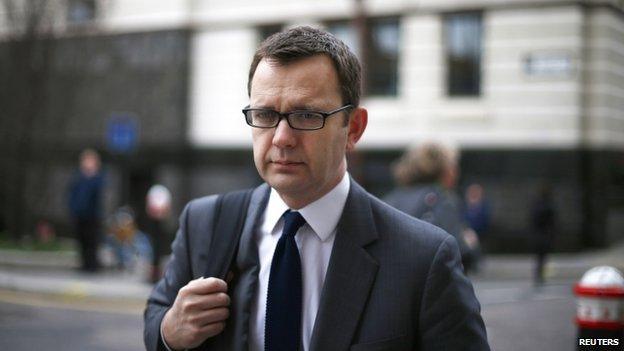
Andy Coulson: Denies conspiracy to hack phones
Clive Goodman had been expected to return for a fifth day in the witness box - but he was taken ill. The rest of his evidence has been adjourned until he is fit enough to return.
Personal and private assistant
Cheryl Carter, Rebekah Brooks's former personal assistant, was the next to take to the witness box.
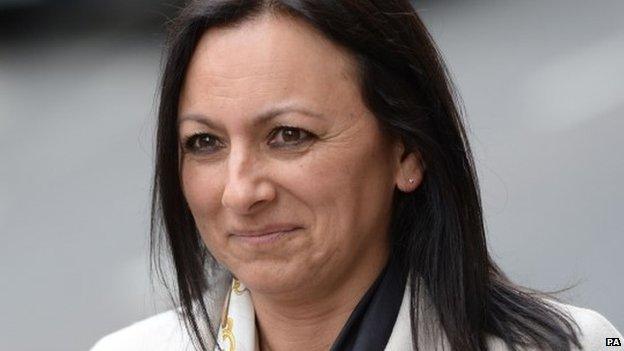
Cheryl Carter worked for Rebekah Brooks for almost two decades
She described how she had stood shoulder-to-shoulder with Mrs Brooks over 16 years - running both her office and personal life. She had access to her bank accounts and helped to arrange her wedding with Charlie Brooks.
The prosecution allege that Mrs Carter destroyed boxes of her boss's notebooks ahead of the News of the World's closure. She denies conspiracy to pervert the course of justice.
She told the trial that the boxes taken from the company's storage centre mostly contained her own work. The former PA went on to deny that Mrs Brooks had sought to repay her by helping her plan to emigrate to Australia.
But in cross-examination, Andrew Edis QC accused her of inventing evidence, including false memories of what the storage boxes contained, and of being dishonest.
Smut, laptops and Pizzagate
Charlie Brooks was the next to give evidence - he denies conspiracy to pervert the course of justice by allegedly organising to hide computers from detectives.
He said that his wife had been "pretty wrecked" as the phone-hacking allegations mounted in 2011 - and she had been "relieved" when James Murdoch allowed her to resign.
Charlie Brooks told the court how much his wife feared being photographed in a public arrest
He said that laptops hidden behind bins at the couple's London home contained drafts and proposals for books he had hoped to have published along with "quite a lot of smut as well".
Asked why he had hidden the laptops, he told the jury he didn't want to be embarrassed if police searches found the pornography and the story leaked to the press.
Mr Brooks said he had asked News International's security chief, Mark Hanna, to look after material including computers on the day that Mrs Brooks had expected to be arrested.
"I feel ashamed of what I have done to Mr Hanna, who is an innocent man," Mr Brooks told the jury. "I am mortified by the way I have embarrassed my wife and given the police the ammunition to smear her."
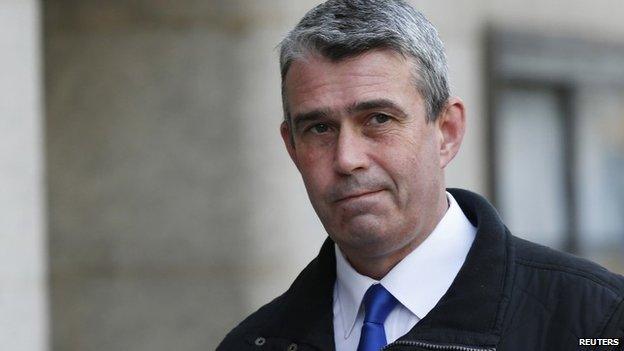
Mr Hanna says he was told items he removed contained pornography
Mark Hanna told the jury that he had agreed to safeguard items for Charlie Brooks and it was "obvious" he did not want the police or his wife to see such material.
During the day the items had been hidden, some of Mr Hanna's security team had arranged for a takeaway to be delivered to the Brooks's London home. One of them had referred to the delivery as "pizzagate".
Andrew Edis, prosecuting, suggested to Mr Hanna that this had been a play-on-words reference to the Watergate scandal in the United States, a cover-up which ultimately led to the resignation of President Richard Nixon.
But Mr Hanna said the only Watergate he knew of was at the Tower of London.
He said that he was loyal to his employer but would not commit a crime for anyone.
Stuart Kuttner: Managing the finances
The News of the World's former managing editor, Stuart Kuttner, began his evidence in the second week of April by saying he didn't authorise payments to police officers.
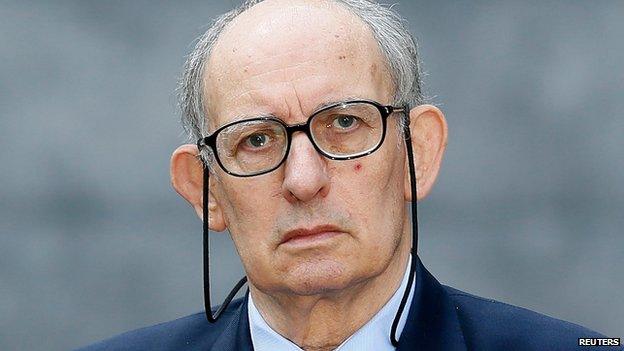
Stuart Kuttner is being tried alongside six other defendants, who all deny the charges against them
One of the former managing editor's jobs had been to oversee reporters' spending - but he said he would tell a reporter to "clear off" if they wanted cash to pay the police.
Mr Kuttner does not face a charge of unlawful payments - but he is accused of being part of the conspiracy to hack phones, something he denies.
The jury has heard how he contacted Surrey Police in 2002 to tell them the newspaper had a voicemail it thought (wrongly) had been left for missing schoolgirl Milly Dowler.
He said he had passed to the police "all the information that I had been given" - and denied authorising reporters to hack phones.
He denied authorising weekly payments to Glenn Mulcaire, the private investigator who has admitted conspiracy to hack phones, in an effort to conceal the true cost of his annual payments.
Lord Carey, the former Archbishop of Canterbury, appeared as a character witness for Stuart Kuttner, saying he "was and is a good man".
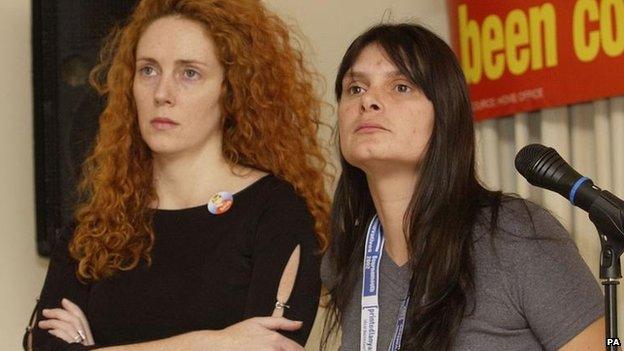
Rebekah Brooks and Sara Payne in 2002
Sara Payne also appeared. Her daughter, Sarah, was murdered in 2000 and the newspaper led a campaign to allow parents to find out more about sex offenders living near them.
Ms Payne said that Rebekah Brooks was "a really sweet girl" and the News of the World was "a force for good".
She described Mr Kuttner as "everything my parents taught me about being a gentleman and having manners. He is a good guy - he has always been there to listen, day or night."
Andy Coulson in the witness box
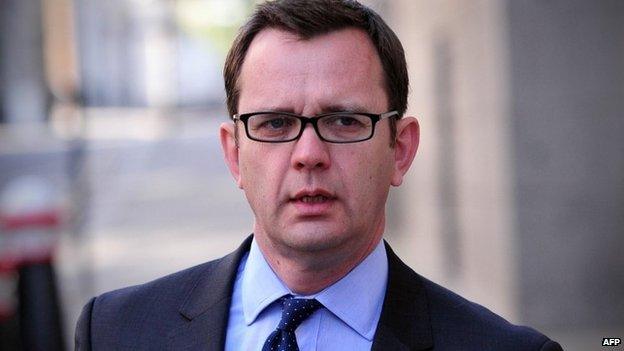
Andy Coulson was the final defendant to take to the witness box.
He denied that his affair with Rebekah Brooks had breached professional standards - but added that it had been wrong and shouldn't have happened.
The BBC's Robin Brant says Mr Coulson's wife was in the public gallery, while Rebekah Brooks listened from the dock
The prosecution allege that the pair's closeness affected their working relationship, meaning that it was inconceivable to suggest that they did not know that hacking was taking place.
The former editor told the jury that, in hindsight, he should have paid more attention to the use of "dark arts" to acquire information, including investigative techniques to uncover private addresses from phone numbers and vice versa.
Mr Coulson, who denies conspiracy to hack phones, confirmed to the jury that he had listened to a voicemail message relating to former home secretary David Blunkett. He said that it was the first and only time a voicemail was played to him and he did not know the material had been the product of an illegal act.
But he rejected allegations, made earlier in the trial, that he heard a voicemail left on the phone of future James Bond actor Daniel Craig.
The second allegation that Mr Coulson faces is that he knew about corrupt payments to police officers. He told the jury that he approved one request from former royal editor Clive Goodman without thinking it through.
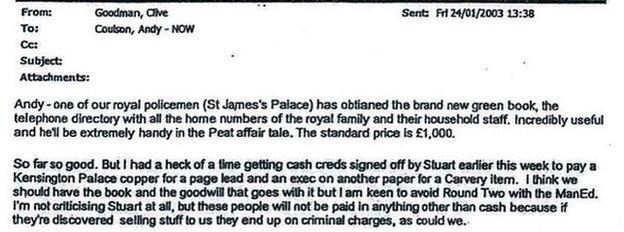
Mr Coulson is warned in the email that being caught making the payment could result in criminal charges
"I didn't believe that Clive Goodman was paying a policeman, I still don't believe that Clive Goodman paid a policeman," Mr Coulson told the Old Bailey.
"What I did was fail to address that properly, but I didn't because I didn't believe him and I rubber-stamped it."
Clive Goodman was arrested in 2006, ultimately leading to his conviction and Andy Coulson's resignation. Mr Coulson told the jury that he felt that his royal editor had "gone behind my back" by hacking royal household phones.
Mr Coulson went on to say that it had been a mistake to expose former home secretary David Blunkett's affair - and the irony was not lost on him, given that this own relationship with Rebekah Brooks was now public knowledge.
David Spens QC, counsel for Mr Goodman, cross-examined Mr Coulson, suggesting he had put pressure on his client to get stories through phone hacking .
"I did not ask Clive Goodman to do that," said Mr Coulson.
Mr Spens continued: "Not only did you know about hacking, you were putting pretty strong pressure on him to do better."
"I had put legitimate pressure on Clive to improve his performance," replied Mr Coulson.
Andrew Edis QC, prosecuting, began his cross-examination by asking why Mr Coulson had never told police his version of events relating to the hacking of both David Blunkett and Milly Dowler.
Mr Edis said: "What you intended to achieve by this - you avoided making any admission about David Blunkett and Milly Dowler, hoping they would never be able to prove it."
Mr Coulson said he had acted on the advice of his solicitor.
He told the court that he ordered a reporter to stop intercepting voicemails because he thought it was a breach of privacy - but not because he knew it was illegal.
He also accepted that he may not have become David Cameron's communications director if all of this had been revealed at the time.
Goodman returns
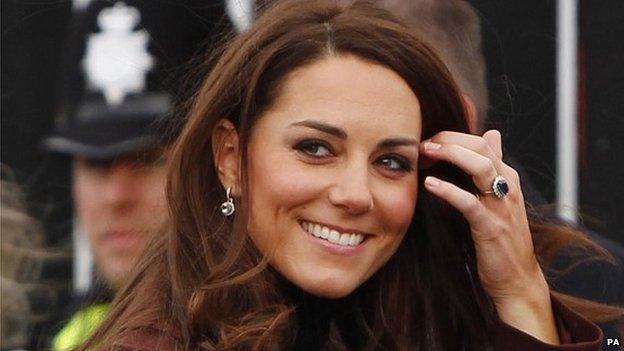
The Old Bailey heard Kate Middleton's phone was hacked on Christmas Eve, Christmas Day and Boxing Day 2005
Clive Goodman, who had earlier been excused from giving evidence because he was ill, returned on 14 May - and the jury heard that he had hacked Kate Middleton's phone 155 times.
The trial was also told, for the first time, that the reporter had also hacked Prince William 35 times.
Turning to the activities of Glenn Mulcaire, Mr Goodman said: "Like him or hate him - and people can make their own judgements about what we did - he was a valuable resource for the paper.
"Virtually every story on the paper ground through the Glenn Mulcaire mill."
And he added that his role in the phone-hacking affair had been just a "spear carrier" compared with a colleague.
Mr Goodman said that the colleague, who cannot be named for legal reasons, was so involved in hacking that prior to his arrest "there was not a single significant story broken at the News of the World in the last couple of years" that had not involved the practice.